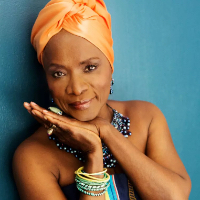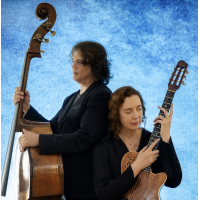Home » Jazz Musicians » Angelique Kidjo
Angelique Kidjo
A powerful singer and tireless performer, Angelique Kidjo has been one of the most successful performers to emerge on world music stages in the 1990s and 2000s. Her music not only draws from African traditions but also interprets the ways those traditions developed after Africans were seized and taken to the New World. Thus elements of American soul, funk, rap, and jazz, Brazilian samba, Jamaican reggae, and Cuban and Puerto Rican salsa all show up on her recordings, along with various African styles
Kidjo is a native of Benin, on Africa's Atlantic coast adjacent to Nigeria; the first of her eight languages was Fon. She was born in the coastal city of Ouidah on July 14, 1960, to government postal official Franck Kidjo (an enthusiastic photographer and banjo player on the side) and his choreographer wife Yvonne. Kidjo was lucky enough to have parents who backed her performing ambitions--female popular vocalists are rare in many African countries. Among her eight siblings were several brothers who started a band when she was young, inspired by James Brown and other American stars who flooded Benin's airwaves. Kidjo was musically eclectic from the start, listening avidly to juju sounds from neighboring Nigeria, to pop music from other African countries, to Cuban salsa music. But, her firsr love was the traditional music which she grew up with.
Kidjo made her stage debut at age six with her mother's dance troupe, and in the late 1970s she formed a band of her own and recorded an album that featured a cover version of a song by another of Kidjo's idols, South African singer Miriam Makeba. In 1980, however, Kidjo found her musical activities restricted by a New Leftist regime that took power in Benin and tried to force her to record political anthems. Kidjo fled to Paris in 1983 with the intent of studying law there and becoming a human rights lawyer. But she realized that she was not cut out for political life.
Her partner in this enterprise was French bassist and composer Jean Hebrail, whom Kidjo married and with whom she has written much of her music; the pair has a daughter, Naima Laura, born in 1993. For several years Kidjo played in a French African jazz band called Pili Pili, led by pianist Jasper van t'Hof, but in 1989 she struck out on her own, forming a band and releasing the album “Parakou.” That debut had its intended effect: it attracted the attention of the biggest name in world music at the time, Chris Blackwell of Britain's Island Records. He signed Kidjo to the label's Mango subdivision, and her second album, “Logozo,” was released in 1991.
Read moreTags
Angelique Kidjo: Crosseyed and Painless

by Geno Thackara
How to tackle a high-energy classic packed with layers of overlapping rhythms? Perhaps by giving it some unexpected breathing space. Angelique Kidjo's Afro-chant treatment (much like the Talking Heads whole-album cover from which it comes) is just as intense as the source, but interestingly smolders more than burns, in a way rather more moody and bewitching. ...
Continue ReadingSomi: Zenzile: The Reimagination Of Miriam Makeba

by Angelo Leonardi
Il legame musicale e simbolico con l'Africa resta centrale nella produzione artistica di Somi, la vocalist e cantautrice statunitense dai genitori africani giunta al successo con gli album The Lagos Music Saloon e Holy Room. Il suo nuovo progetto è dedicato a Miriam Makeba, che avrebbe compiuto 90 anni il 4 marzo, data di pubblicazione del presente album. I brani in scaletta, tutti presi dallo storico repertorio della cantante, sono condivisi col musical Dreaming Zenzile, che Somi ...
Continue ReadingAngelique Kidjo/Femi Kuti at Denver Botanic Gardens

by Geoff Anderson
Angelique Kidjo/Femi Kuti Denver Botanic Gardens Denver, CO August 9, 2018 There is a Groove Heaven. I have proof. Angelique Kidjo, international world-beat star, recently released a song by song cover of the Talking Heads album Remain in Light (Sire, 1980). Kidjo, from Benin, has been exploring and laying down African rhythms for years now. Before that, Remain in Light hit the scene, the airwaves and innumerable turntables with its heavy influence from African rhythms, ...
Continue ReadingAngelique Kidjo at Nourse Auditorium, San Francisco

by Harry S. Pariser
Angelique Kidjo California Institute of Integral Studies Nourse Theater June 21, 2014 “I believe that any feeling of xenophobia and fear comes from ignorance. Often people think that when you are not like them, you are different and therefore you are a threat. It is not true. I think that the problem of xenophobia today is coming from the world economic crisis. Some people, for example, think that as foreigners we are going to take ...
Continue ReadingAfrica Rising: Angelique Kidjo at Town Hall NYC

by David Miller
Angelique KidjoTown HallNew York, New YorkMarch 26, 2010Angelique Kidjo's album Oyo (Razor & Tie, 2010) includes guest vocal appearances from the likes of John Legend and Dianne Reeves. At Town Hall, without the services of Legend or Reeves, Kidjo sung the entirety of Curtis Mayfield's “Move On Up" and Aretha Franklin's “Baby I Love You" all by her lonesome. Was the audience missing something? Not at all. The sheer power of Kidjo's voice and her ...
Continue ReadingDrummer Daniel Freedman Leads An All-Star Quintet On Imagine That, With Rhythmically Infectious Originals, A Radiohead Cover And Guest Vocal On "Baby Aya" By World Music Star Angélique Kidjo

Source:
Jason Byrne, Red Cat Publicity
Drummer Daniel Freedman Leads an All-Star Quintet on Imagine That, with Rhythmically Infectious Originals, a Radiohead Cover and Guest Vocal on “Baby Aya" by World Music Star Angélique Kidjo The album—to be released in the U.S. by Anzic Records on April 15, 2016—finds Freedman in league with a group of kindred spirits: guitarist Lionel Loueke, keyboardist Jason Lindner, bassist Omer Avital and percussionist Gilmar Gomes. “His restless global spirit has informed the music of renowned artists such as Anat Cohen ...
read more
Angelique Kidjo: Daughter of Independence

Source:
AAJ Staff
By Angelique Kidjo Like a true revolutionary, I was born on Bastille Day (July 14), 1960, in Dahomey, which was then a part of the French Empire in West Africa. A few days later, on August 1st, 50 years ago this month, my country was declared independent: I was French for just 18 days! It is not easy for me to judge the 50 years of independence of my small country, now called Benin. I feel that my life has ...
read more
New Album by Angelique Kidjo + MP3 Download

Source:
Giant Step
Deemed Africa's premier diva by Time, Angelique Kidjo follows up her Grammy-winning Djin Djin with Oyo. On the album, Kidjo collaborates with Bono one of the continents most ardent supporters joined with John Legend on a version of Curtis Mayfields Move on Up. The focus on Oyo is the music that shaped Kidjos artistic formation, including Lakutshn Llanga, a lullaby made famous by Kidjos hero, Miriam Makeba; Yoruban interpretations of Otis Reddings Ive Got Dreams to Remember and Santanas Samba ...
read more
Berklee to Honor Gamble & Huff, Angelique Kidjo, Paco de Lucia, Kenny Barron at Commencement

Source:
Michael Ricci
Berklee College of Music President Roger Brown will present Kenneth Gamble, Leon Huff, Paco de Lucia, Angelique Kidjo, and Kenny Barron with honorary doctor of music degrees at Berklee College of Music?s commencement ceremony, Saturday, May 8, at the 7, 000-seat Agganis Arena at Boston University. Commencement speaker Kenneth Gamble will address more than 860 Berklee graduates, their parents and invited guests. This year?s honorary doctorate recipients are being recognized for their achievements and influence in music, and for their ...
read more
Anglique Kidjo Brings African Experiences to Her Craft

Source:
Michael Ricci
Benin-born pop diva makes her Disney Hall debut on Sunday night.
The term clanked off Anglique Kidjo's ear when she first heard it. “African American." How could someone be American and African at the same time, she wondered? “You think I'm stupid because I'm a little girl?" Kidjo asked the person who'd used the expression. She was 9 years old. Speaking by phone recently, the Benin-born Afro-pop diva, who will make her Walt Disney Concert Hall debut with her four-piece ...
read more
Angelique Kidjo Friday, March 26 at Town Hall Celebrating the Release of Her New CD "Oyo"

Source:
Michael Ricci
The Town Hall (123 West 43rd Street), Times Square's landmark concert venue, is pleased to present ANGELIQUE KIDJO on Friday March 26 at 8:00PM. This concert celebrates her new CD OYO, to be released at the end of March 2010. Ms. Kidjo will perform selections from her new CD OYO and also past favorites. Tickets are on sale now for $50 and $45 through Ticketmaster, 212-307-4100 or ticketmaster.com, or by visiting The Town Hall Box Office at 123 West 43rd ...
read more
651 ARTS Presents Three-Time Grammy Nominee Angelique Kidjo

Source:
All About Jazz
Olalekan Oduntan
vocalsPhotos
Music
Boarding Pass (feat Sammy Figueroa)
From: Boarding PassBy Angelique Kidjo













_with_Skip_Mcdonald_(Right)_23_n.jpg)








